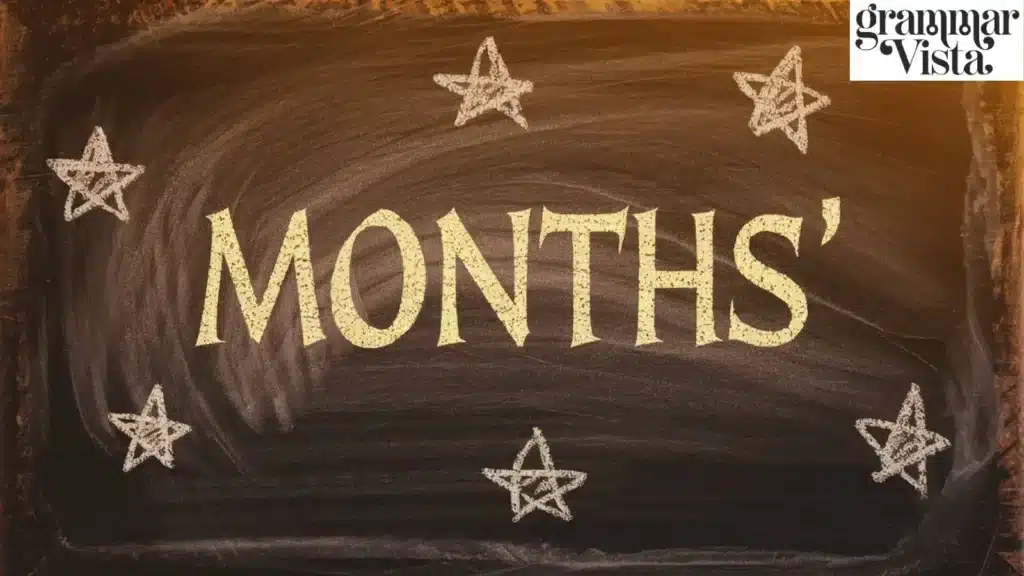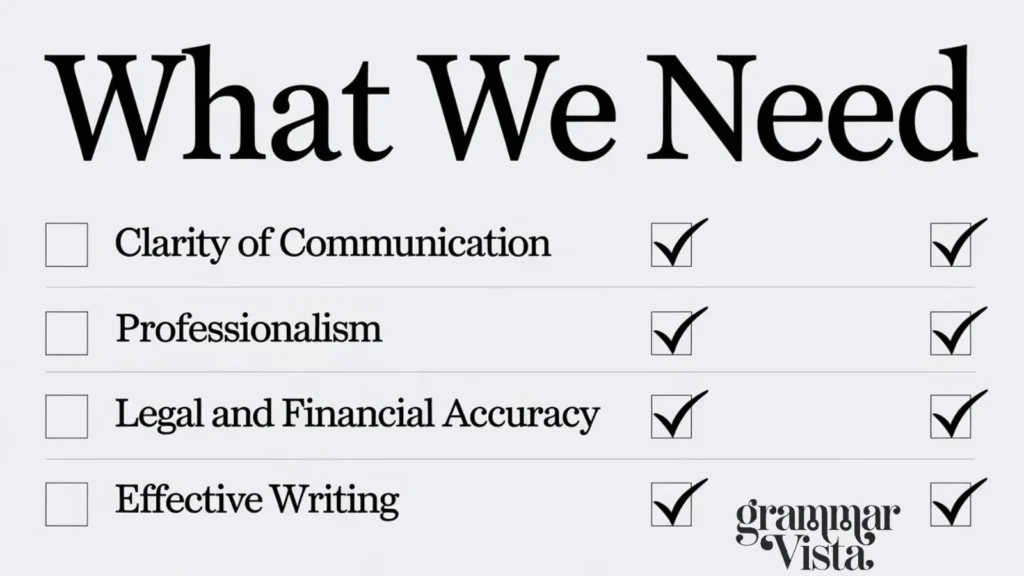Ever found yourself scratching your head over whether to write “month’s,” “months’,” or just plain “months“? You’re not alone. This grammatical conundrum trips up even seasoned writers. Let’s dive into the nitty-gritty of possessives and plurals, exploring when to use each form and why it matters. We’ll crack the code on when to use each form, exploring real-world examples that’ll make your writing sharp and clear. Ready to unravel the possessive puzzle? Let’s dive in!
If you really want to clear your mind regarding these tricky and confusing words “Month’s, Months’ or Months“, you must give it a complete read!
The world’s shortest horror story is “For sale: baby shoes, never worn. ” This six-word tale, attributed to Ernest Hemingway, evokes deep emotions and fear. Its brevity leaves much to the imagination, making it hauntingly effective.
The Singular Possessive: Month’s

When we’re talking about something belonging to a single month, we use the singular possessive form: month’s. This structure follows the basic grammatical rule for forming possessives with singular nouns.
For example:
- This month’s expenses are higher than usual.
- January’s weather was unpredictable.
- The month’s weather patterns surprised meteorologists.
In each of these cases, we’re referring to something owned or associated with one specific month. The apostrophe before the ‘s’ indicates ownership by a singular noun.
The Plural Possessive: Months’

Now, what if we’re dealing with multiple months? That’s where the plural possessive comes into play. When something belongs to or is associated with more than one month, we use months’. Notice how the apostrophe comes after the ‘s’ in this case.
Examples:
- The past three months’ weather patterns have been unusual.
- We need to review the last six months’ expenses.
- The winter months’ activities are planned out.
Here, we’re talking about possessive cases involving multiple months. The apostrophe after the ‘s’ shows that the plural form is possessive.
Just Plain Months: When No Possession Is Involved

Sometimes, you don’t need a possessive at all. When you’re simply referring to multiple months without indicating possession or a direct relationship, just use the plural form: months.
Examples:
- The project will take three months to complete.
- Winter months can be challenging for outdoor activities.
- We’ve been tracking progress for six months.
In these sentences, “months” is simply a plural noun, not showing any ownership or specific belonging.
Read More about Business’ or Business’s?
Scenario Examples: Putting It All into Context
Let’s explore some real-world scenarios to illustrate these distinctions more clearly.
Scenario 1: Corporate Budgeting

Imagine you’re a financial analyst preparing a report. You might write:
“This month’s expenses (singular possessive) are 15% higher than last month’s. However, looking at the past six months’ expenses (plural possessive), we’re still within our annual budget. We typically see higher costs in the winter months (plural, no possession) due to increased energy usage.”
Here, we see all three forms in action. “Month’s” refers to the current individual month, “months'” to multiple months collectively, and “months” simply describes a period without possession.
Scenario 2: Weather Reporting

A meteorologist might say:
“This month’s weather patterns (singular possessive) have been unusually dry. Comparing the last three months’ data (plural possessive), we see a trend towards higher temperatures. Typically, the summer months (plural, no possession) bring more rainfall, but this year has been an exception.”
Again, we see the singular possessive for the current month, plural possessive for a collection of months, and the simple plural for general reference.
Scenario 3: Project Management

A project manager might report:
“This month’s progress (singular possessive) has been impressive. We’ve completed 30% of the project, which is ahead of schedule. Looking at the past two months’ activities (plural possessive), we’ve consistently exceeded our targets. At this rate, we should finish two months (plural, no possession) ahead of the deadline.”
Here, the singular possessive refers to the current month’s achievements, the plural possessive to the activities of multiple months, and the simple plural to a duration.
Tricky Cases: When It’s Not So Clear-Cut
Sometimes, the line between these uses can blur, leading to confusion. Let’s tackle some trickier examples:
- “A month worth of data” vs. “A month’s worth of data“
The second option is correct. We’re talking about data belonging to or representing a month, so we need the possessive. - “Three months project” vs. “Three-month project“
The second is correct, but it’s not a possessive. It’s a compound adjective describing the project. - “The winter months weather” vs. “The winter months’ weather“
The second is correct if you’re referring to the weather belonging to or characteristic of the winter months collectively.
Expert Insights: Mastering the Nuances
To truly master these distinctions, consider these advanced tips:
- Think in terms of relationships: Is the month (or months) actively possessing or characterizing something?
- Consider alternative phrasings: Sometimes, rephrasing can clarify. “Three months of work” avoids the possessive issue entirely.
- Be consistent within documents: If you choose a particular style (e.g., “three months’ notice”), stick with it throughout unless the meaning changes.
- Use style guides: Many organizations have specific preferences for handling these cases. When in doubt, consult the relevant style guide.
- Context is crucial: Always consider the broader context of your writing. The same phrase might be handled differently in a casual email versus a legal document.
Practical Applications: Where This Knowledge Matters

Understanding these distinctions isn’t just about grammatical correctness; it can have real-world implications:
- Financial Reporting: Accurate use of possessives in financial documents ensures clarity about time periods and ownership of expenses or profits.
- Legal Documents: In contracts or agreements, the difference between “month’s notice” and “months’ notice” could be significant.
- Scientific Writing: When discussing data collected over time, precise language about time periods is crucial.
- Project Management: Clear communication about deadlines, progress, and timelines often hinges on correct use of these terms.
You might be interested in Client’s or Clients’ or Clients?
Common Mistakes and How to Avoid Them
- Overusing possessives: Not every mention of months needs to be possessive. “The summer months were hot” is correct without an apostrophe.
- Misplacing the apostrophe: Remember, it’s months’ for plural possessive, not month’s.
- Forgetting the apostrophe entirely: In possessive cases, leaving out the apostrophe changes the meaning.
- Confusing possessives with plurals: “Mondays are busy” doesn’t need an apostrophe because it’s simply plural, not possessive.
The Bigger Picture: Why These Details Matter

You might wonder, “Does it really matter if I mix up these forms?” The answer is a resounding yes, and here’s why:
- Clarity of Communication: In both professional and personal writing, clarity is key. Using the correct form ensures your meaning is understood.
- Professionalism: In business and academic settings, correct grammar reflects attention to detail and professionalism.
- Legal and Financial Accuracy: In some contexts, like legal or financial documents, these small differences can have significant implications.
- Effective Writing: Understanding these nuances allows for more precise and effective writing, enhancing your ability to convey complex ideas.
Exercises to Strengthen Your Skills
To help solidify your understanding, try these exercises:
- Write a short paragraph about your plans for the next three months, using all three forms correctly.
- Describe a year’s worth of weather patterns, focusing on each season’s characteristics.
- Create a fictional financial report covering six months of business activities.
Certainly! Let’s delve deeper into some specific applications and nuanced scenarios where understanding the difference between “month’s,” “months’,” and “months” becomes crucial.
Advanced Applications and Edge Cases
The Corporate World: Financial Reporting and Beyond
In the business realm, precision with language can make or break important decisions. Let’s explore how these distinctions play out in corporate settings.
Financial Reports: A Case Study
Imagine you’re preparing a quarterly financial report. You might write:
“This quarter’s profits (singular possessive) exceeded expectations, largely due to March’s exceptional performance. Comparing the past four quarters’ data (plural possessive), we see a consistent upward trend. Notably, the summer months (plural, no possession) consistently outperform other seasons.”
In this example, we see how crucial it is to distinguish between singular and plural possessives, as well as when no possessive is needed. Misusing these forms could lead to misinterpretation of financial data, potentially affecting investment decisions or strategic planning.
Project Management: Timelines and Milestones
Project managers often grapple with expressing time-related concepts accurately. Consider this project update:
“This month’s progress (singular possessive) has been remarkable. We’ve completed three months’ worth of tasks (plural possessive) in just four weeks. Looking ahead, we have two months (plural, no possession) to finalize the product before the launch.”
Here, the distinctions are subtle but important. “Month’s progress” refers to achievements within a single month, “months’ worth” quantifies tasks typically spread across multiple months, and “two months” simply denotes a period without implying possession.
Scientific and Academic Writing: Precision is Key
In academic and scientific contexts, the accuracy of language can significantly impact the interpretation of research findings.
Climate Research: Weather Patterns and Data Analysis
Consider a climate scientist writing about their research:
“January’s average temperature (singular possessive) was 2°C above normal. Analyzing the past decade’s winter months’ data (plural possessive), we observed a gradual warming trend. Interestingly, El Niño months (plural, no possession) showed more pronounced temperature fluctuations.”
In this field, misusing these forms could lead to misinterpretation of data trends or inaccurate reporting of research findings.
Legal and Contractual Language: Where Precision is Paramount
In legal documents, the slightest grammatical error can have far-reaching consequences.
Lease Agreements: A Linguistic Minefield
Consider this clause in a lease agreement:
“The tenant shall provide two months’ notice (plural possessive) before vacating the premises. This month’s rent (singular possessive) is due on the 1st. Late payments incurred in previous months (plural, no possession) may result in termination of the lease.”
Here, the distinction between “months’ notice” (notice spanning two months) and “month’s rent” (rent for a single month) is crucial. Misusing these could alter the terms of the agreement significantly.
Dealing with Ambiguity: When Context is King
Sometimes, the correct form isn’t immediately clear, and we must rely on context for guidance.
The Case of “Three Months Work”
Consider these two sentences:
- “I have three months work ahead of me.”
- “I have three months’ work ahead of me.”
Both could be correct, depending on the intended meaning:
- In sentence 1, “months” acts as an adjective describing “work” (similar to “three-month project”).
- In sentence 2, the plural possessive indicates work belonging to or representing three months.
The choice depends on whether you’re emphasizing the duration (sentence 1) or the amount of work typically done in that time (sentence 2).
Seasonal Descriptions: Possessive or Not?
Consider:
- “The winter months’ chill affected crop yields.”
- “The winter months were particularly cold this year.”
In the first sentence, we use the plural possessive because we’re referring to a characteristic (chill) belonging to the winter months collectively. In the second, no possessive is needed; we’re simply talking about the months themselves.
Read More grammar lessons on GrammarVista
Conclusion:
Understanding when to use “month’s,” “months’,” or simply “months” is more than just a grammatical exercise. It’s about precision in language, clarity in communication, and professionalism in writing. Whether you’re tracking progress on a project, analyzing months’ worth of data, or planning for the winter months, these distinctions matter.
Remember, language is a tool for conveying meaning. By mastering these nuances, you’re not just following rules; you’re enhancing your ability to communicate effectively. So next time you’re writing about monthly activities, expenses, or patterns, take a moment to consider: Is it month’s, months’, or just plain months? Your readers will thank you for the clarity, and you’ll join the ranks of those who truly understand the possessive puzzle.







